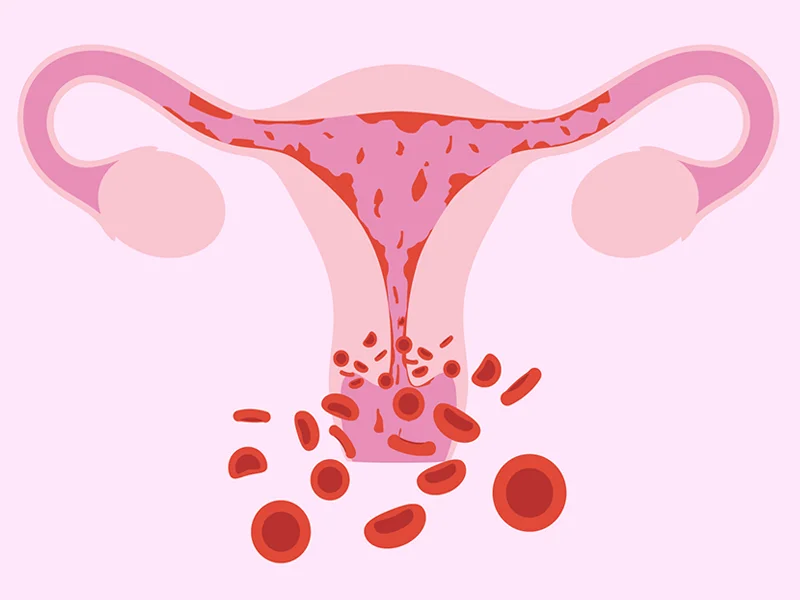
Heavy Menstrual Bleeding (Menorrhagia)
When your periods are exceptionally heavy or lengthy, you have heavy menstrual bleeding, also known as menorrhagia There can be many reasons for heavy periods with blood clots but Menorrhagia is one of its types.
Symptoms
- Frequently need to change pads, tampons or menstruation cup more than recommended
- Periods prolonged for more than 7 days.
- Heavy blood clots mostly larger than about 2.5 cm
- Feel tired and short of breath.
- Not able to do daily activity or exercise.
Causes
-
Hormone imbalance. Hormone imbalances can be brought on by a variety of disorders, such as PCOS, obesity, insulin resistance, and thyroid issues, the ovaries are not working properly. if your ovaries do not release an egg (ovulate) during a menstrual cycle, your body does not produce the hormone progesterone as it would during a typical menstrual cycle. (anovulation). As a result, there may be a hormonal imbalance and menorrhagia.
- Dysfunction of the ovaries. Primary ovarian insufficiency(POI) or Dysfunction of ovaries refers to when the ovaries stop functioning normally in females younger than 40 (POI). The ovary does not release an egg as frequently as it should when POI is present. POI has also been referred to as premature menopause and premature ovarian failure. However, they are not entirely accurate. Even after POI, the ovaries of a female could still be partially functional. One of the ovaries releases an egg once a month on average. The hormones progesterone and oestrogen are also produced by the ovaries. These have an impact on breast development, the menstrual cycle, and pregnancy. A POI patient can have less eggs. Alternatively, the ovaries can not develop or release eggs properly. The ovaries then stop producing hormones in regular amounts.
- Uterine fibroids. Uterine fibroids, also known as leiomyomata, affect millions of women worldwide and have a high incidence of 75% in women who are of reproductive age. They are a major cause of menorrhagia. Menorrhagia, or heavy menstrual flow, is caused by uterine fibroids in about 30% of individuals, and more than half of those patients have symptoms including heavy monthly bleeding, pelvic pain, or infertility. Uterine fibroids are myometrial benign tumours that develop inside the uterus. Myocytes rather than fibroblasts make up the majority of fibroids, which are distinguished by an excessive accumulation of extracellular matrix materials, primarily collagen, inside the tumour.
- Polyps. Heavy or protracted menstrual bleeding may be brought on by uterine polyps, small, benign growths on the lining of the uterus.
- Adenomyosis. The condition known as adenomyosis, which is pronounced “add-en-o-my-OH-sis,” occurs when endometrial-like tissue begins to protrude into the muscle wall of your uterus (myometrium). Your uterus becomes thicker and bigger as a result; it can even double or triple in size. Its symptoms includes, Period pain, heavy or protracted menstrual bleeding with clotting, and pelvic/abdominal pain
- Intrauterine device (IUD). A common side effect of using a non hormonal intrauterine device for birth control is menorrhagia. You can make plans for alternative management alternatives with the aid of your doctor.
- Inherited bleeding disorders.
- A few bleeding disorders, such as von Willebrand’s disease, which is characterised by a deficiency or impairment of a critical blood-clotting factor, can result in irregular menstrual bleeding.
- Medications. Heavy or protracted menstrual bleeding can be caused by a number of drugs, including anti-inflammatory drugs, hormone-balancing drugs like oestrogen and progestin, and anticoagulants like warfarin (Coumadin, Jantoven) or enoxaparin (Lovenox).
- Other medical conditions. Other medical conditions, including liver or kidney disease, may be associated with menorrhagia.
Diagnosis
- Blood tests. A sample of your blood may be evaluated for iron deficiency (anemia) and other conditions, such as thyroid disorders or blood-clotting abnormalities.
- Pap test. In this test, cells from your cervix are collected and tested for infection, inflammation or changes that may be cancerous or may lead to cancer.
- Endometrial biopsy. Your doctor may take a sample of tissue from the inside of your uterus to be examined by a pathologist.
- Ultrasound. This imaging method uses sound waves to produce images of your uterus, ovaries and pelvis.
Treatment
Menorrhagia treatment depends on many factors some of them are:
- Your overall health and medical history
- The cause and severity of the condition
- Your tolerance for specific medications, procedures or therapies
- The likelihood that your periods will become less heavy soon
- Your future childbearing plans
- Effects of the condition on your lifestyle
- Your opinion or personal preference
Medications
If you have Anaemia due to menorrhagia, your doctor may recommend you to take iron supplements regularly. Even if your iron levels are low but you are not anaemic you are suggested to take iron supplements to avoid consequences.

